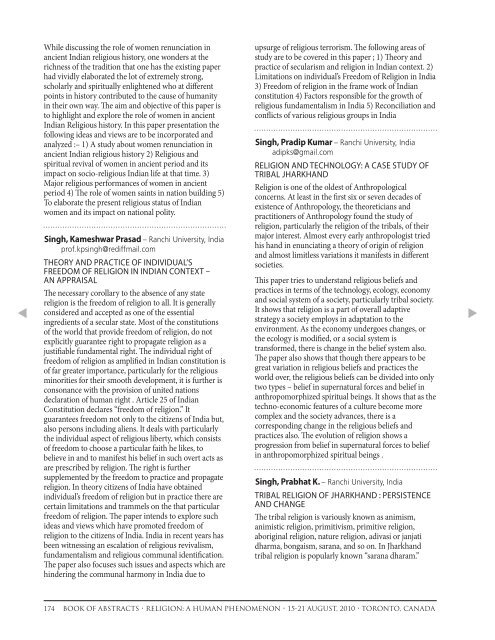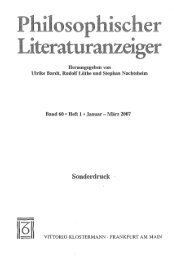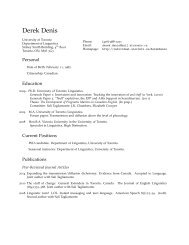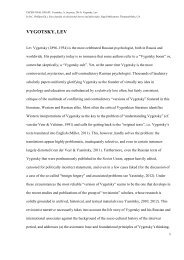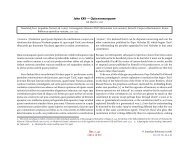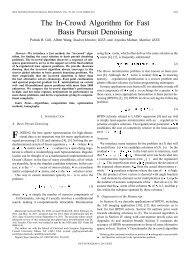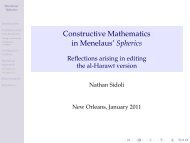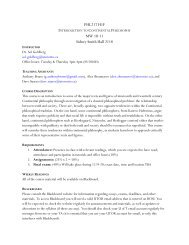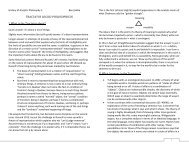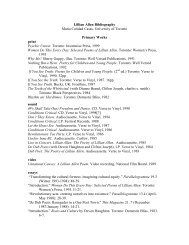BOOK of ABSTRACTS XXTh WORld COngReSS InTeRnATIOnAl ...
BOOK of ABSTRACTS XXTh WORld COngReSS InTeRnATIOnAl ...
BOOK of ABSTRACTS XXTh WORld COngReSS InTeRnATIOnAl ...
Create successful ePaper yourself
Turn your PDF publications into a flip-book with our unique Google optimized e-Paper software.
While discussing the role <strong>of</strong> women renunciation in<br />
ancient Indian religious history, one wonders at the<br />
richness <strong>of</strong> the tradition that one has the existing paper<br />
had vividly elaborated the lot <strong>of</strong> extremely strong,<br />
scholarly and spiritually enlightened who at different<br />
points in history contributed to the cause <strong>of</strong> humanity<br />
in their own way. The aim and objective <strong>of</strong> this paper is<br />
to highlight and explore the role <strong>of</strong> women in ancient<br />
Indian Religious history. In this paper presentation the<br />
following ideas and views are to be incorporated and<br />
analyzed :– 1) A study about women renunciation in<br />
ancient Indian religious history 2) Religious and<br />
spiritual revival <strong>of</strong> women in ancient period and its<br />
impact on socio-religious Indian life at that time. 3)<br />
Major religious performances <strong>of</strong> women in ancient<br />
period 4) The role <strong>of</strong> women saints in nation building 5)<br />
To elaborate the present religious status <strong>of</strong> Indian<br />
women and its impact on national polity.<br />
Singh, Kameshwar Prasad – Ranchi University, India<br />
pr<strong>of</strong>.kpsingh@rediffmail.com<br />
tHeory and Practice <strong>of</strong> individual’s<br />
freedom <strong>of</strong> religion in indian context –<br />
an aPPraisal<br />
The necessary corollary to the absence <strong>of</strong> any state<br />
religion is the freedom <strong>of</strong> religion to all. It is generally<br />
considered and accepted as one <strong>of</strong> the essential<br />
ingredients <strong>of</strong> a secular state. Most <strong>of</strong> the constitutions<br />
<strong>of</strong> the world that provide freedom <strong>of</strong> religion, do not<br />
explicitly guarantee right to propagate religion as a<br />
justifiable fundamental right. The individual right <strong>of</strong><br />
freedom <strong>of</strong> religion as amplified in Indian constitution is<br />
<strong>of</strong> far greater importance, particularly for the religious<br />
minorities for their smooth development, it is further is<br />
consonance with the provision <strong>of</strong> united nations<br />
declaration <strong>of</strong> human right . Article 25 <strong>of</strong> Indian<br />
Constitution declares “freedom <strong>of</strong> religion.” It<br />
guarantees freedom not only to the citizens <strong>of</strong> India but,<br />
also persons including aliens. It deals with particularly<br />
the individual aspect <strong>of</strong> religious liberty, which consists<br />
<strong>of</strong> freedom to choose a particular faith he likes, to<br />
believe in and to manifest his belief in such overt acts as<br />
are prescribed by religion. The right is further<br />
supplemented by the freedom to practice and propagate<br />
religion. In theory citizens <strong>of</strong> India have obtained<br />
individual’s freedom <strong>of</strong> religion but in practice there are<br />
certain limitations and trammels on the that particular<br />
freedom <strong>of</strong> religion. The paper intends to explore such<br />
ideas and views which have promoted freedom <strong>of</strong><br />
religion to the citizens <strong>of</strong> India. India in recent years has<br />
been witnessing an escalation <strong>of</strong> religious revivalism,<br />
fundamentalism and religious communal identification.<br />
The paper also focuses such issues and aspects which are<br />
hindering the communal harmony in India due to<br />
upsurge <strong>of</strong> religious terrorism. The following areas <strong>of</strong><br />
study are to be covered in this paper ; 1) Theory and<br />
practice <strong>of</strong> secularism and religion in Indian context. 2)<br />
Limitations on individual’s Freedom <strong>of</strong> Religion in India<br />
3) Freedom <strong>of</strong> religion in the frame work <strong>of</strong> Indian<br />
constitution 4) Factors responsible for the growth <strong>of</strong><br />
religious fundamentalism in India 5) Reconciliation and<br />
conflicts <strong>of</strong> various religious groups in India<br />
Singh, Pradip Kumar – Ranchi University, India<br />
adipks@gmail.com<br />
religion and tecHnology: a case study <strong>of</strong><br />
triBal JHarkHand<br />
Religion is one <strong>of</strong> the oldest <strong>of</strong> Anthropological<br />
concerns. At least in the first six or seven decades <strong>of</strong><br />
existence <strong>of</strong> Anthropology, the theoreticians and<br />
practitioners <strong>of</strong> Anthropology found the study <strong>of</strong><br />
religion, particularly the religion <strong>of</strong> the tribals, <strong>of</strong> their<br />
major interest. Almost every early anthropologist tried<br />
his hand in enunciating a theory <strong>of</strong> origin <strong>of</strong> religion<br />
and almost limitless variations it manifests in different<br />
societies.<br />
This paper tries to understand religious beliefs and<br />
practices in terms <strong>of</strong> the technology, ecology, economy<br />
and social system <strong>of</strong> a society, particularly tribal society.<br />
It shows that religion is a part <strong>of</strong> overall adaptive<br />
strategy a society employs in adaptation to the<br />
environment. As the economy undergoes changes, or<br />
the ecology is modified, or a social system is<br />
transformed, there is change in the belief system also.<br />
The paper also shows that though there appears to be<br />
great variation in religious beliefs and practices the<br />
world over, the religious beliefs can be divided into only<br />
two types – belief in supernatural forces and belief in<br />
anthropomorphized spiritual beings. It shows that as the<br />
techno-economic features <strong>of</strong> a culture become more<br />
complex and the society advances, there is a<br />
corresponding change in the religious beliefs and<br />
practices also. The evolution <strong>of</strong> religion shows a<br />
progression from belief in supernatural forces to belief<br />
in anthropomorphized spiritual beings .<br />
Singh, Prabhat K. – Ranchi University, India<br />
triBal religion <strong>of</strong> JHarkHand : Persistence<br />
and cHange<br />
The tribal religion is variously known as animism,<br />
animistic religion, primitivism, primitive religion,<br />
aboriginal religion, nature religion, adivasi or janjati<br />
dharma, bongaism, sarana, and so on. In Jharkhand<br />
tribal religion is popularly known “sarana dharam.”<br />
174 BOOk Of ABstRACts • RELIGION: A HUMAN PHENOMENON • 15-21 AUGUst, 2010 • tORONtO, CANAdA


